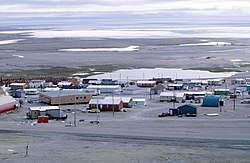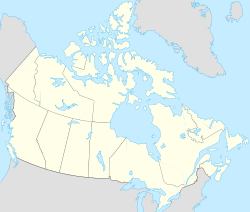Resolute, Nunavut
|
Resolute ᖃᐅᓱᐃᑦᑐᖅ Qausuittuq |
||
|---|---|---|

Resolute in 1997. Visible on the left is a long school building (brown).
|
||
|
||
| Coordinates: 74°41′51″N 094°49′56″W / 74.69750°N 94.83222°WCoordinates: 74°41′51″N 094°49′56″W / 74.69750°N 94.83222°W | ||
| Country | Canada | |
| Territory | Nunavut | |
| Region | Qikiqtaaluk Region | |
| Electoral district | Quttiktuq | |
| Government | ||
| • Type | Hamlet Council | |
| • Mayor | Mavis Manik | |
| • MLA | Isaac Shooyook | |
| Area | ||
| • Total | 116.89 km2 (45.13 sq mi) | |
| Elevation | 66 m (217 ft) | |
| Population (2006) | ||
| • Total | 229 | |
| • Density | 2.0/km2 (5.1/sq mi) | |
| Time zone | CST (UTC-6) | |
| • Summer (DST) | CDT (UTC-5) | |
| Canadian Postal code | X0A 0V0 | |
| Area code(s) | 867 | |
Resolute or Resolute Bay (Inuktitut: Qausuittuq ᖃᐅᓱᐃᑦᑐᖅ literally “place with no dawn") is a small Inuit hamlet on Cornwallis Island in Nunavut, Canada. It is situated at the northern end of Resolute Bay and the Northwest Passage and is part of the Qikiqtaaluk Region.
Resolute is one of Canada's northernmost communities and is second only to Grise Fiord on Ellesmere Island (Alert and Eureka are more northerly but are not considered towns – just military outposts and weather stations). It is also one of the coldest inhabited places in the world, with an average yearly temperature of −15.7 °C (3.7 °F). As of the 2006 census the population was 229, an increase of 6.5% from the 2001 census. Like in most other northern communities, the roads and most of the terrain are all gravel.
The area shows evidence of being occupied sporadically by the Dorset culture (Tunit) and later the Thule people from as early as 1500 BCE until 1000 CE. However, modern Inuit did not occupy or use the area until the 1953 relocation.
In 1947 Canada and the United States built a weather station, Resolute Weather Station, and an airstrip as part of the Joint Arctic Weather Stations, known today as the High Arctic Weather Stations. This was followed in 1949 by a Royal Canadian Air Force base, RCAF Station Resolute Bay. At that time the population was made up of military personnel and specialists, such as meteorologists, from the south. Today the base serves as a starting point for Arctic research and access to both the North Pole and the North Magnetic Pole.
...
Wikipedia



